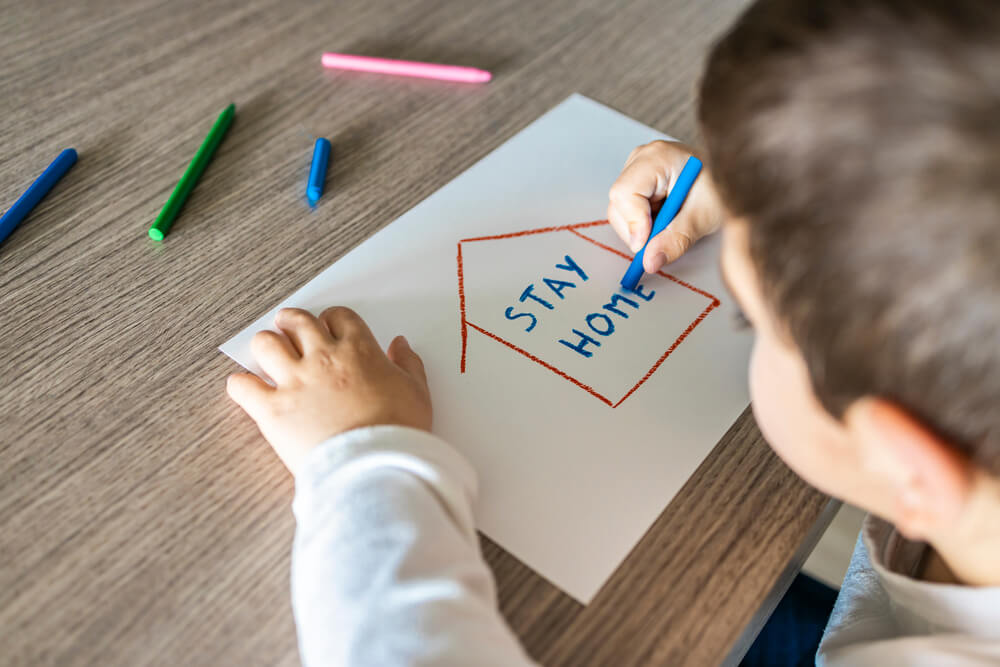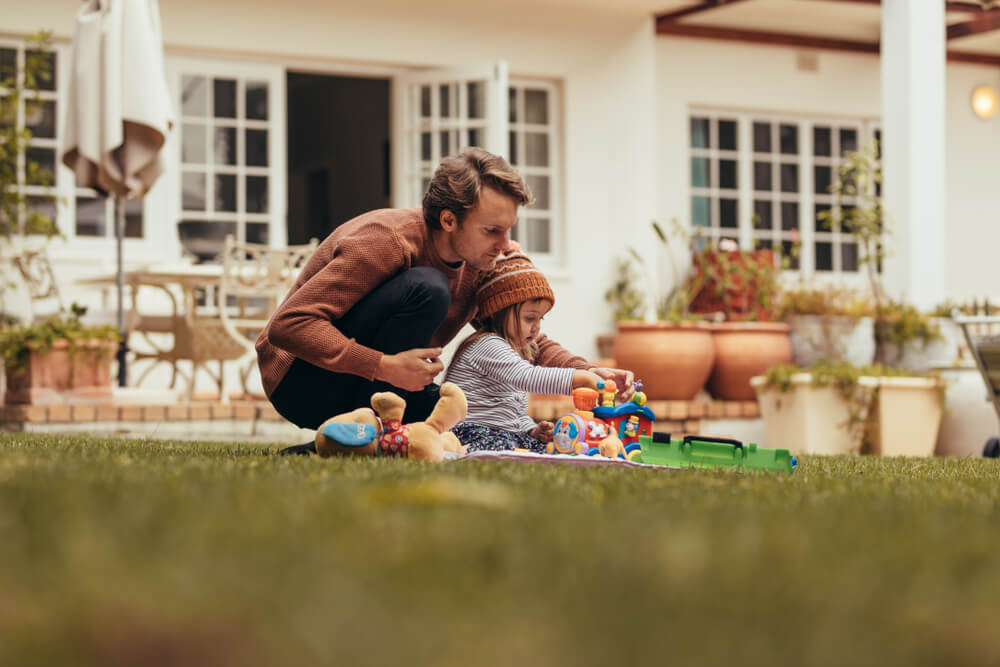My, have things certainly changed in our lives in the past few weeks because of COVID-19! Schools are closed, you may be working from home, and most businesses are closed as well.
With the Coronavirus pandemic continuing to spread throughout Florida, it’s important that we remember the lives of our children have changed too. You may have school-aged kids who are now being homeschooled or younger children who stay at home and are now seeing mom and dad pulling double duty of working and childcare. Whatever changes have occurred in your family, it’s important to remember that children are very observant to change. Even when parents do their best to shield them from the news and social media and not mention COVID-19 in front of them. In recent days, you may have noticed that your children are quieter than usual, seem angry or confused. You may also notice them “playing” doctor or quarantining their stuffed animals. All of these reactions are normal and expected ways that kids respond to anxiety and uncertainty. But how can you explain the changes in our lives that Coronavirus has caused in a way that children will understand? Are you also wondering how to explain anxiety to a child, so she will understand what she’s feeling right now?
Here are some tips to help you do just that, and feel free to contact best pediatrician in kendall area if you have any specific questions given your family’s unique situation or anxiety symptoms your child may be exhibiting.
How to Talk to Your Kids About the Coronavirus Pandemic
The specific way you talk about COVID-19 with your children is going to be highly dependent on their ages, emotional maturity and peer influences. Tweens and teens, for example, are likely hearing more than you realize from social media and their friends. Elementary school children may have heard information about the virus by their teachers or classmates before schools closed down. And preschoolers and toddlers are likely very confused about why things have suddenly changed. Many parents have called me to ask how to protect children during these uncertain times. My short answer – be as honest as you need to be, and focus on the positives and the helper. First, you want to make sure that the information you’re telling your kids about Coronavirus is factual. Explain to them that it’s an illness that is easily spread and makes some people, especially grandmas and grandpas, sick. Also, reassure your children that doctors are finding that kids themselves are very unlikely to feel unwell if they catch this virus. Then, focus on what your family is doing to protect itself from catching or spreading Coronavirus, including:
- Washing our hands often, while counting to at least 20 as we wash to make sure we get rid of all the germs on them.
- Remaining inside as much as possible to avoid germs.
- Staying away, temporarily, from people who might get sick from Coronavirus, like grandmas, grandpas, and older aunts and uncles.
My next piece of advice is to redirect your children’s attention to how doctors, nurses, and other healthcare professionals are working hard to keep people healthy and help those who are sick. When thinking about this topic, I’m often reminded of this famous quote by Mister Rogers:
“When I was a young boy and I would see scary things in the news, my mother would say to me, ‘Look for the helpers. You will always find people who are helping.’”
You can reassure your kids by discussing all the different people in their lives who are currently helping to stop the spread of Coronavirus, and treat those who are sick, including:
- You and your family, who are staying home right now so you don’t catch germs and spread them.
- Their friends and extended family members in your area who you can’t go visit right now because they are at their own homes doing their part to make sure COVID-19 doesn’t spread any further.
- Doctors and nurses, just like their very own pediatrician baby doctor and the nurses in her office, who are seeing kids and grownups who are sick, testing them for the virus, and treating them so they can get better.

How to Explain Anxiety to a Child in the Age of Coronavirus
Right now, people of all ages around the world are experiencing anxiety about the spread of COVID-19. This includes children too. However, many children don’t understand what anxiety is, or how to manage these feelings.
As the organization Worry Wise Kids says, the best way you can explain anxiety to children and keep them from experiencing heightened levels of anxiety right now is to be as open and honest with them about Coronavirus as is age-appropriate. When kids see things changing and aren’t told why it’s natural for them to assume the worst. But truthful information about what’s going on – and what they can do about it – soothes children.
To talk to your kids about anxiety, you should first start by asking them how they feel and observing if they’re experiencing any of these common anxiety symptoms in children, including:
- Feeling clingy to caregivers.
- Crying a lot.
- Being scared, fearful, worried, or upset about current events.
- Experiencing physical symptoms such as feeling shaky or jittery, feeling butterflies in their stomach, or having a racing heartbeat.
- Being more easily irritated or angered.
If your child expresses that he is experiencing any of these symptoms, it’s important for you to teach him anxiety coping skills. These include:
- Encouraging your child to slow down and take deep breaths when she feels nervous or worried.
- Working with your child to set a specific time of day to feel and talk about his anxiety, only during that time.
- Modeling healthy coping skills yourself. If your children see or hear you worrying about Coronavirus, they’re more likely to worry about it themselves.
How to Protect Children During This Pandemic
While things are definitely not normal right now, the best thing you can do for your kids is to set a routine and do as many normal family activities as possible. This means:
- Continuing to eat meals together as a family.
- Sticking to their regular sleep and hygiene schedules.
- Spending time together as a family by doing fun, indoor activities such as reading books, playing board games, making crafts, putting puzzles together, and playing with toys and your imaginations.
- Calling or FaceTiming people your children would normally interact with on a day-to-day or weekly basis, including extended family members and friends.
- Playing outside in your backyard to get some sunshine and fresh air.

Remind Your Child That These Times Are Temporary
Perhaps the best thing you can talk about with your child is that the changes they’re currently experiencing because of COVID-19 are temporary. While the days may seem long and boring right now while your child is shuttering in at home, Coronavirus will soon be a distant memory.
Without promising an exact timeline, remind your child that:
- Doctors are saying that eventually, we’ll all be able to go back to our normal routines.
- They’ll be back in school next year.
- Doctors are working on a vaccine to protect people from Coronavirus so that in the future, this virus won’t cause the disruptions we’re currently experiencing.
Remember, Only Healthy Parents Can Take Care of Their Kids During This Pandemic
Finally, in addition to my above recommendations, remember that the best way to take care of your children during these times is to take care of yourself first. Practice social distancing. Eat healthy foods and get plenty of rest. Remember to perform self-care. After all, like flight attendants always say before takeoff, in the event of an emergency you have to put your own oxygen mask on first before you can help others. If you have any questions, feel free to call me at (305) 614-5331.




